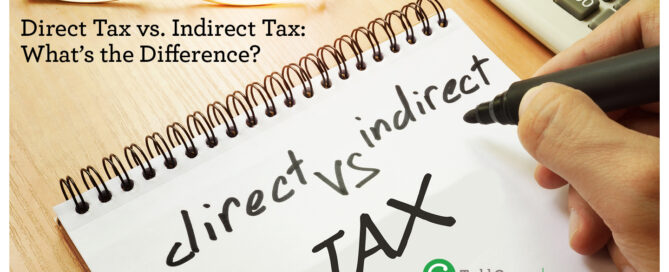Direct Tax vs. Indirect Tax: What’s the Difference?
Direct tax vs. indirect tax. You’ve probably heard these terms before, but do you understand what they are and how they differ? Keep reading to learn the differences between direct tax and indirect tax.
What is a direct tax?
A direct tax is a tax levied on companies and individuals that cannot be passed onto another taxpayer.
What’s more? Direct tax is progressive, and the tax burden increases with income. Meaning, an individual with a high income will pay a disproportionate share of the tax burden, whereas someone with a lower income will see a small tax burden.
Direct tax types
There are five categories of direct tax: individual income tax, corporate income tax, capital gains income, estate tax and property tax.
Individual income tax
Individual income tax, or personal tax, is a tax imposed on salaries, wages, investments or other forms of income a household receives.
Corporate income tax
Incorporated businesses are taxed on their profits minus their allowable deductions. This is a corporate income tax.
Capital gains tax
Capital gains tax is a tax on the profit made from the sale of an asset, such as stocks or property. These tax rates can vary depending on two factors: income level and how long an asset has been held.
Estate Tax
Estate tax is a tax on the net value of a person’s taxable estate at the time of their passing. The estate pays the tax before any assets are distributed to the heirs.
Property tax
Property tax is a tax imposed on commercial and residential properties such as buildings and land. This tax can also be levied on tangible personal property like business equipment, inventory and vehicles. Property taxes vary between states.
What is an indirect tax?
Continuing with direct tax vs. indirect tax, indirect tax is a tax that can be passed on to another entity or individual. This type of tax can be imposed on goods or services.
Furthermore, an indirect tax is regressive. Meaning the tax is applied regularly regardless of an individual’s level of income.
Indirect tax types.
There are four main types of indirect tax: sales tax, excise tax, value-added tax and gross receipts tax.
Sales tax
Sales tax is a consumption tax on the sale of goods and services. This means once the tax is added to the sales price of a good or service, it is then charged by the retailer. The retailer then remits that tax to the government. Sales taxes differ from state to state.
Excise tax
Excise tax is a tax levied on specific goods such as alcohol, tobacco and fuel. Typically, companies pay the excise tax and then pass the cost of it onto the consumer—this is known as the hidden tax.
Value-add tax
Value-add tax, or VAT, is a tax on the value added at each stage of the production of a good. Each business along the production chain pays a VAT at that stage, and the business in the earlier stage is then reimbursed. Ultimately, the end consumer pays the VAT.
Gross receipts tax
The gross receipts tax is a sales tax that applies to business-to-business transactions. Businesses are required to pay on their gross receipts, or their gross sales, without deductions. The gross receipts tax is applied to the business, but the cost of the gross receipts is often passed onto the consumer.
Summary
To summarize, it may help to talk to a professional when it comes to dealing with direct tax vs. indirect tax. If you are ready to start understanding your taxes better, give us a call at (704) 919-3220. And in the meantime, continue reading our blogs for more industry news and tips.










